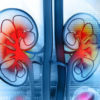Diabetes is a chronic condition that affects millions of people across the United States. At Bergen Medical Associates, patients in northern New Jersey and surrounding areas can receive ongoing treatment for both Type 1 and Type 2 diabetes from caring, experienced practitioners. Find out more about risk factors for diabetes, diagnostic tests, and how the condition is managed.
Diabetes
Diabetes Care in Northern New Jersey
What Is Diabetes?
 Whenever a person digests food, a sugar known as glucose enters their bloodstream. The pancreas is responsible for releasing insulin that helps this glucose move from the bloodstream and into muscles, fat cells, and other tissues, where it will be stored or used for energy.
Whenever a person digests food, a sugar known as glucose enters their bloodstream. The pancreas is responsible for releasing insulin that helps this glucose move from the bloodstream and into muscles, fat cells, and other tissues, where it will be stored or used for energy.
However, if the pancreas doesn’t produce enough insulin, or the body does not have a normal insulin response, the person will have high blood sugar levels. Patients with diabetes have chronically high blood sugar because of insulin resistance or problems with pancreatic function.
There are two main types of diabetes:
- Type 1 diabetes: This is an autoimmune condition in which the body attacks the cells in the pancreas that produce insulin.
- Type 2 diabetes: This type of diabetes happens when a person develops insulin resistance over time and usually happens later in life.
According to the Centers for Disease Control and Prevention, Type 2 diabetes is the most common, accounting for more than 90% of diabetes cases in the United States.
What Are the Symptoms of Diabetes?
Typical symptoms of diabetes include:
- Excessive hunger or thirst
- Frequent urination
- Fatigue
- Vision problems
- Difficulty healing from cuts or bruises
Certain symptoms are specific to Type 1 or 2 diabetes. For example, patients with Type 1 diabetes may experience unexplained weight loss, even if they consume more calories. People with Type 2 diabetes may have circulatory issues that lead to numbness or tingling feelings in the hands and feet.
What Are the Risk Factors for Diabetes?
Risk factors for diabetes vary by type. There are several well-documented risk factors for Type 2 diabetes, including:
- Family history: If a patient’s parents or siblings have Type 2 diabetes, they are more likely to develop it themselves.
- Lifestyle: Patients who are sedentary and don’t get enough physical activity are more at risk.
- Racial or ethnic background: In the U.S., African American, Alaskan Native, American Indian, and Latino patients have a higher risk of Type 2 diabetes than other groups.
- Age: Type 2 diabetes is more common among people over the age of 45.
Risk factors for Type 1 diabetes are less clear, but family history likely plays a role. The onset of type 1 diabetes is more common in childhood and adolescence, though adults can get it, too.
How Is Diabetes Diagnosed?
If a patient suspects they have diabetes, their endocrinologist or internist will review their symptoms, lifestyle, and medical history. Several different blood tests can help confirm a diagnosis of Type 1 or 2 diabetes:
- A1C test: This test can assess a patient’s average blood sugar over the previous 60 to 90 days by measuring the percentage of blood sugar attached to a protein in the blood called hemoglobin. An A1C level of 6.5% or higher confirms a diagnosis of diabetes.
- Fasting blood sugar test: This test measures a patient’s blood sugar level after fasting overnight and can help test for both prediabetes and diabetes.
- Glucose tolerance test: This test also requires an overnight fast and will measure a patient’s blood sugar level before and after drinking a sugary liquid.
- Random blood sugar test: This test does not require fasting and simply takes a blood sample at a random time.
If a patient is suspected to have Type 1 diabetes, they also may have a urine test, as well as blood testing for certain immune system cells that attack insulin.
Is Diabetes Treatable?
Unfortunately, there is no cure for diabetes. However, both Type 1 and 2 can be managed long-term. A diabetes management plan typically has a few key components:
- Insulin: All patients with Type 1 diabetes and some patients with Type 2 diabetes need synthetic insulin to manage their condition and maintain healthy glucose levels. They may use an injection, insulin pen, or pump.
- Monitoring: Ongoing monitoring of blood sugar levels is needed for all types of diabetes. Some patients wear a glucose monitor, while others test themselves each day with a finger stick and glucose meter.
- Medicine: Oral diabetes medications can help patients with gestational diabetes or Type 2 diabetes manage their blood sugar.
- Nutrition: Because food directly affects blood sugar levels, patients need to track how much they eat and the types of foods they are eating. Patients with diabetes may be referred to a dietitian.
- Exercise: Physical activity is also important, as regular exercise can help reduce insulin resistance.
Because diabetes affects everyone differently, each patient will receive a personalized treatment plan.
Find Compassionate Diabetes Care at Bergen Medical Associates
With multiple locations throughout Northern New Jersey, Bergen Medical Associates offers in-person and telehealth visits for patients with chronic conditions such as diabetes. Bergen Medical Associates provides primary and specialty care, including endocrinology, internal medicine, and nutrition services. Request an appointment or contact us today.












